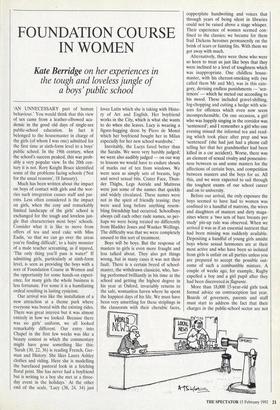FOUNDATION COURSE IN WOMEN
Kate Berridge on her experiences in
the tough and loveless jungle of a boys' public school
`AN UNNECESSARY part of human behaviour.' You would think that this view of sex came from a leather-elbowed aca- demic in the good old days of single-sex public-school education. In fact it belonged to the housemaster in charge of the girls (of whom I was one) admitted for the first time at sixth-form level to a boys' public school. In the 19th century, when the school's success peaked, this was prob- ably a very popular view. In the 20th cen- tury it is not. Rory Knight Bruce identified some of the problems facing schools (Not for the usual reasons', 18 January).
Much has been written about the impact on boys of contact with girls and the wor- ries such integration causes staff and par- ents. Less often considered is the impact on girls, when the cosy and remarkably limited landscape of the girls' school is exchanged for the tough and loveless jun- gle that characterises most boys' schools. Consider what it is like to move from offers of tea and seed cake with Miss Eadis, 'so that we can go over the areas you're finding difficult', to a hairy monster of a male teacher screaming, as if injured, `The only thing you'll pass is water!' If admitting girls, particularly at sixth-form level, is seen as providing the boys with a sort of Foundation Course in Women and the opportunity for some hands-on experi- ence, for many girls the whole business is less fortunate. For some it is a humiliating ordeal resulting in lasting cynicism.
Our arrival was like the installation of a new attraction at a theme park where everyone was bored with the existing rides. There was great interest but it was almost entirely in how we looked. Because there was no girls' uniform, we all looked remarkably different. Our entry into Chapel in the first few weeks was like a beauty contest in which the commentary might have gone something like this: `Sarah (30, 22, 36) is reading French, Ger- man and History. She likes Laura Ashley clothes and riding. Here she is modelling the barefaced pastoral look in a fetching floral print. She has never had a boyfriend but is writing to a boy she met at a three- day event in the holidays.' At the other end of the scale, 'Lucy (38, 24, 34) just loves Latin which she is taking with Histo- ry of Art and English. Her boyfriend works in the City, which is what she wants to do when she leaves. Lucy is wearing a figure-hugging dress by Piero de Monzi which her boyfriend bought her in Milan especially for her new school wardrobe.'
Inevitably, the Lucys fared better than the Sarahs. We were very harshly judged; we were also audibly judged — on our way to lessons we would have to endure shouts of marks out of ten from windows. We were seen as simply sets of breasts, legs and novel sexual bits. Crater Face, Thun- der Thighs, Legs Astride and Mattress were just some of the names that quickly and widely circulated. These names were not in the spirit of friendly teasing: they were used long before anything resem- bling friendship had occurred. Schoolboys always call each other rude names, so per- haps we were being treated no differently from Bladder Jones and Wanker Wellings. The difficulty was that we were completely unused to this sort of treatment.
Boys will be boys. But the response of masters to girls is even more fraught and less talked about. They also got things wrong, but in many cases it was not their fault. There is a certain breed of school- master, the withdrawn classicist, who, hav- ing performed brilliantly in his time at the school and getting the highest degree in his year at Oxford, invariably returns to the safe, womanless haven where he spent the happiest days of his life. We must have been very unsettling for these striplings in the classroom with their cherubic faces, copperplate handwriting and voices that through years of being silent in libraries could not be raised above a stage whisper. Their experience of women seemed con- fined to the classics; we became for them frail Dickens heroines permanently on the brink of tears or fainting fits. With them we got away with much.
Alternatively, there were those who were so keen to treat us just like boys that they were inclined to a level of toughness which was inappropriate. One childless house- master, with his cheroot-smoking wife (we called them Mr and Mr), was in this cate- gory, devising endless punishments — 'sen- tences' — which he meted out according to his mood. These included gravel-shifting, log-chopping and cutting a hedge with scis- sors for offences which even now seem incomprehensible. On one occasion, a girl who was happily singing in the corridor was `sentenced'; and I remember a girl who one evening missed the informal tea and read- ing which took place after prep and was `sentenced' (she had just had a phone call telling her that her grandmother had been killed in a car accident). Worse, there was an element of sexual rivalry and possessive- ness between us and some masters for the affections of certain boys, and competition between masters and the boys for us. All this, and we were expected to sail through the toughest exams of our school career and on to university.
Before our arrival, the only exposure the boys seemed to have had to women was confined to a handful of matrons, the wives and daughters of masters and dirty maga- zines where a 'two sets of bare breasts per study' pin-up rule was observed. When we arrived it was as if an essential nutrient that had been missing was suddenly available.
Depositing a handful of young girls amidst boys whose sexual hormones are at their most active and who have been so isolated from girls is unfair on all parties unless you are prepared to accept the possible out- come of such a combustible mixture. A couple of weeks ago, for example, Rugby expelled a boy and a girl pupil after they had been discovered in flagrante.
More than 18,000 15-year-old girls took formal advice on contraception last year. Boards of governors, parents and staff must start to address the fact that their charges in the public-school sector are not so different from their contemporaries in state schools in what they want to get up to. They must also face up to the fact that for each canoodling couple caught there are many more who won't be. In my year, at least two girls were on the pill when they arrived; the majority had fairly inno- cent relationships with boys but some had very intense sexual relationships. One lib- eral master lent a love-struck couple the art- room keys for assignations and, in another case, a serious flirtation between a girl and a master developed into an affair after she left. One boy and girl got married but divorced three years later.
We have a long way to go before we get the right formula for the treatment of girls at boys' schools, and perhaps we will never be as relaxed about it as the school in Los Angeles which announced this week that it was putting condom machines on the premises.
As things stand, boys' schools continue to experiment with girls. If their new girls fall in love they may do less well academi- cally, as indeed will the boys who fall for them, and if they are caught making love they will be expelled. But if the girls last the course they will have gained academi- cally and will have enjoyed better facilities than those at their old girls' school. They will also learn one very important fact of life: girls with big breasts have the best time.



























































 Previous page
Previous page